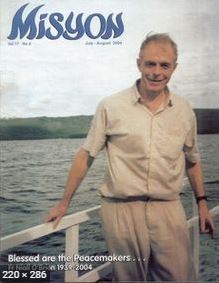 The ashes of Father Niall O’Brien had been be brought to Bacolod City from Ireland last June 14, 2004.
The ashes of Father Niall O’Brien had been be brought to Bacolod City from Ireland last June 14, 2004.
After a funeral Mass led by Bishop Vicente Navarra of Bacolod, people organized a procession of cars to Kabankalan, 75 kilometers south of the city, where the late priest served after Kabankalan diocese was carved from Bacolod in 1987
The ashes had been buried the following day in the Columban Fathers’ plot in the Catholic cemetery after a prayer vigil.
Father Niall, 64, died on April 28, 2004 in Italy, where since December 2003 he had been undergoing an experimental treatment for his condition
Peace advocate Cesar Villanueva, who had worked with Father O’Brien, said the German chapter of Pax Christi International plans to build a peace center in Bacolod that would be Niall O’Brien Peace Center for Active Nonviolence.
The gesture commemorates the late missioner’s role in joining with Villanueva to restart the peace movement’s Philippine chapter in 1995
He is to serve as the first director of Niall O’Brien Peace Center.
Father O’Brien, born in Ireland in 1939, was ordained a priest in 1963. He arrived in the Philippines the following year to serve a section of Bacolod diocese that now belongs to Kabankalan diocese.
The two dioceses serve 706,984 people, 90 percent of them Catholics, on Negros.
In the 1970s and the 1980s, severe poverty, growing resistance to a centuries-old feudal system and militarization on the island, then the sugar capital of the Philippines, fueled a communist rebellion and hostility between leaders of the local Church and powerful landowning families. In Kabankalan,
He pioneered several programs to address the needs of local people, many of whom were Basic Christian Community (BCC) members who suffered during the martial law years (1972-1981) and a subsequent wave of starvation brought on by a drop in the world sugar price
However, Fr. Niel will probably be remembered most as one of the “Negros 9” The two Columbans, a diocesan priest and six lay Church workers were imprisoned in 1983 on charges of murdering a mayor and his four bodyguards.
The priests were kept under house arrest for eight months until their demand to be jailed with the six lay workers was granted. They spent six months in the Bacolod City jail before the case was dismissed for lack of evidence. Father Neil later wrote in his books about the stories of inmates.
Father O’Brien set up a liturgical commission in the diocese in the 1980s. In the early 1970s it staged a contest for the best Ilonggo Mass with music, and picked seven winners.
He also started retreats for men at a time when few males attended church. Many of the men who joined the retreats, given in Ilonggo, now lead BCCs.
Believing that gullible poor farmers were doomed to fail if merely given land to own, Father O’Brien experimented with the Israeli kibbutz model for communal farming communities, three of which still exist.
Just before his death, the late missioner was starting a pastoral magazine for Filipino priests, called ‘Misyon’.
Father Niall
20 Sunday Jun 2004
Posted in Uncategorized
